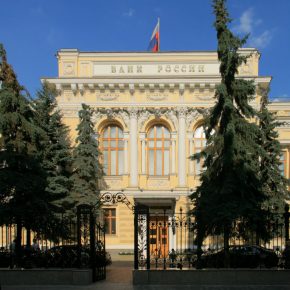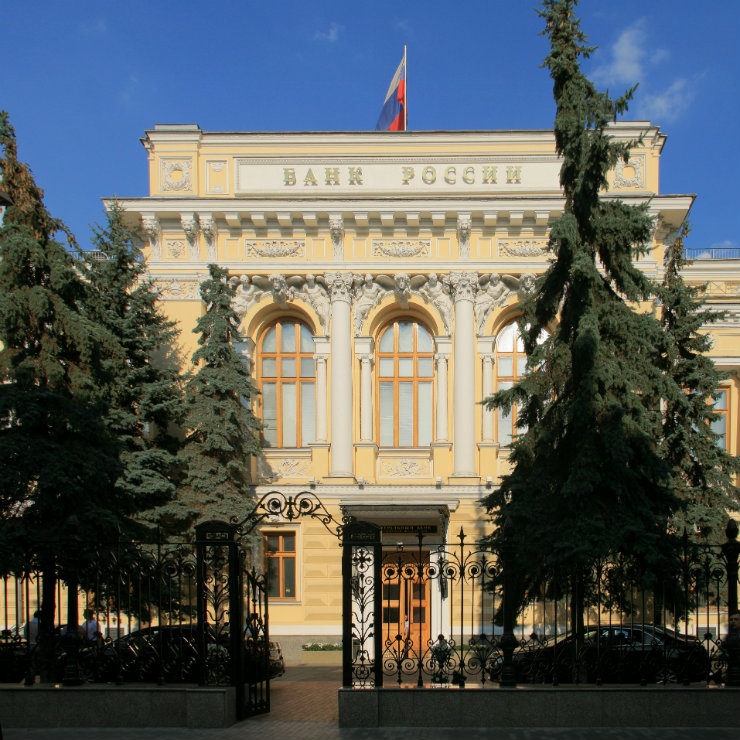Tydzień w gospodarce
Category: Trendy gospodarcze

The Central Bank of Russia, Moscow, Russia (Ludvig14, CC BY-SA)
According to the CBR’s statement, the new bank was “granted a license to conduct all banking operations in both RUB and foreign currency. The bank does not have the right, however, to attract funds of individuals in the form of deposits and it is also not allowed to conduct operations with precious metals.”
Instead of focusing on traditional, retail offline banking and holding client’s deposits, Bank 131 will be servicing Russian companies and entrepreneurs that work online for international internet companies, as well as individuals that make purchases online from global eCommerce platforms.
According to the Russian Corporate Registry, the founder and the sole owner of the Bank 131 is the director of Fix IT-holding Dmitry Eremeev, who has made his name in Russia with the cashback service ePN.bz. It teams up with dozens of international companies to offer cashback services to its clients. Among the most prominent ones are: AliExpress, Booking.com, Aviasales, and Banggood.com. The company claims to have over 3 million users worldwide, who have spent almost the USD1bn shopping through their platform, receiving nearly the USD60m in cashback.
Expanding his international online business to an online banking sector seems to be a logical step. In an interview for the Russian business daily Vedomosti, Mr. Eremeev confirmed his role in the Russian newest bank, adding that the initial investment is RUB340m, exceeding the RUB300m limit for an initial investment set up by Russia’s Central Bank.
Mr. Eremeev also noted that he made all this money with the help of his online cashback service. The bank has been officially registered in the Russian city of Kazan and named after a local school that Mr. Ereemev attended in his youth.
According to Mr. Eremeev, Bank 131’s main activities will include money transfers and financial settlement services for companies doing business online, such as retailers, social networks, cashback services, etc. “The bank also plans to work with individuals through their e-wallets and develop an IT platform on the basis of which it would be able to issue payment cards, develop loyalty programs and other financial products for client companies,” he told Vedomosti.
One thing the bank certainly won’t do is issue loans. Although the company will be partially funded by deposits of legal entities, Bank 131 won’t be holding these deposits. Instead, it will place them on the accounts of the Russian Central Bank. The main source of income will be transaction fees.
“We have no experience with loans. So, in order to avoid risks, it makes more sense for us to place money on accounts of the CBR,” Mr. Ereemev told Vedomosti, adding that the bank will start servicing companies in fall 2019.
Bank 131’s founder expects to reach an annual turnover of around RUB500bn, hoping to receive hefty commissions from payments by companies such as AirBnb, or transfers of salaries for Russian-based web developers working for international IT companies.
The last time CBR allowed a new bank to enter the Russian financial market was in April 2015, when a license was granted to CMR Bank from Moscow. The Russian financial regulator has been engaged in an extensive clean-up of the banking sector ever since the appointment of its Governor, Elvira Nabiullina, back in 2013.
Since then, more than 400 banks have been forced to leave the market. According to the rating agency Expert RA, about 50 more banks will have to close down in 2019. This is a result of the war Russia’s financial regulator has been waging against money laundering and other bank-related criminal activities.
According to the Russian edition of the Forbes magazine, the sectoral clean-up has made the Russian banking market much more transparent. This particularly applies to commercial banks, especially the subsidiaries of foreign ones. However, when it comes to the government-controlled banks or the banks under international sanctions, there certainly is much less transparency.
The fact that Bank 131 was granted a permission to enter the Russian banking market, after nearly a four-year vacuum, might signify a growing confidence in the Russian online sector, which is, for the most part, developing quite independently of the government.
However, there are experts that are not so optimistic. According to Konstantin Korischenko, former deputy chairman of the Central Bank of Russia, the license granted to Bank 131 should be seen more as a one-time event and no new wave of bank registration should be expected. „Four years of interruption in the establishment of new banks were connected only with the fact that there were no attractive conditions for business development,” he told Vesti Kavkaza, adding that the conditions within Russian banking sector are still very far from optimal.
Filip Brokeš is an analyst and a journalist specializing in international relations.


